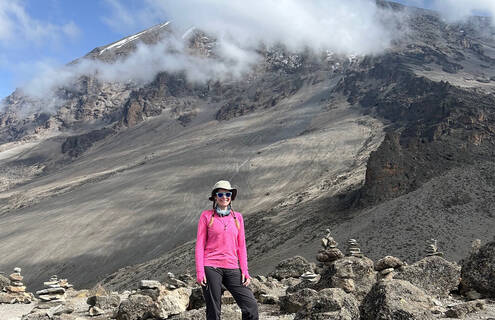
This story was previously published in the May 2025 edition of Connections, Dartmouth Health’s employee magazine.
Not many people can claim they climbed 49 mountains—including Tanzania’s 19,341-foot Mt. Kilimanjaro—in less than two years. But Hilary Brown, MSN, RN, an ICU nurse at Cheshire Medical Center, is one who can.
“I wanted to prove I could do it,” Brown said. “It had been a goal of mine for years.”
A broken leg is what set this extraordinary quest in motion.
In 2023, Brown sustained a significant fracture in her right leg while skiing at Wildcat Mountain in Gorham, NH. It required surgery, including a bone graft, plate and screws. As she was recovering, she realized that she could no longer do the sport she loved: running.
“The stress on my leg was too great,” she said, “so I had to switch to alternate forms of aerobic exercise.”
So, she began hiking, starting with a goal of climbing the “New Hampshire 48,” a group of 4,000-foot hikes in the White Mountains. Climbing all 48 is a feat recognized by the Appalachian Mountain Club.
“It took approximately 18 months for me to complete the 48 peaks,” Brown said.
During that time, she learned a lot about her capabilities—and her courage.
“Though I did a few hikes with friends, mostly I was alone,” she said. “I learned that I am capable of things that I never imagined, including hiking long distances and camping and cooking in the woods. I was quite nervous doing that alone, but it all worked out and I learned that I could count on myself.”
Brown hiked the last of the 48 New Hampshire peaks—Wildcat, where she had broken her leg—just two weeks before leaving to climb Kilimanjaro, the highest mountain in Africa.
“My injury made me realize that I am lucky to be able to do something like that now and that could change at any moment, as it did when I broke my leg, so I decided to just go for it,” Brown said.
She traveled to Africa on her own, but was accompanied on the hike by two other Americans, as well as a trekking group that included two guides, a cook and other support personnel. The eight-day climb up the mountain meant going through five climate zones, starting with farmland and villages and ending in an arctic landscape with glaciers, the only ones on that continent.
The most challenging part of the hike for Brown was what she calls “summit day/night,” which consists of about 16 hours of continuous hiking.
“At midnight, after a few hours of sleep, you start hiking the 4,000-or-so feet from base camp to the summit. It was dark and freezing cold and we were at high altitude, which causes some unpleasant symptoms including dizziness, shortness of breath and nausea,” Brown said. “We didn’t reach the summit until about 6 am. After summiting, we then had to descend around 11,000 feet back down to our final camp.”
Despite the difficulties, Brown says it was all worth it. Standing at the summit, above the clouds, she and her fellow hikers celebrated their accomplishment.
“It was quite emotional,” Brown said. But, she adds, despite the emotion, they couldn’t cry. “Crying made it more difficult to breathe and we needed to conserve oxygen.”
Brown said her ability to meet such challenges had been strengthened at Cheshire during the COVID-19 pandemic.
“After working in the cardiology clinic for a few years, I was reallocated back to the ICU to assist during the pandemic surge,” she said. “It was a very stressful time overall due to the volume and acuity of patients and the fact that I needed to get reoriented back into the critical care environment.”
With her enhanced coping skills from the pandemic under her belt, Brown is looking forward to more mountains, more summits and a night in the desert.
“I have several mountains on my bucket list, including Mt. Elbrus, the highest peak in Europe, and Everest base camp in Nepal,” she said. “I’m planning a trip this fall to hike Mt. Toubkal in Morocco, the highest peak in North Africa, and spending a night in the Sahara Desert.”